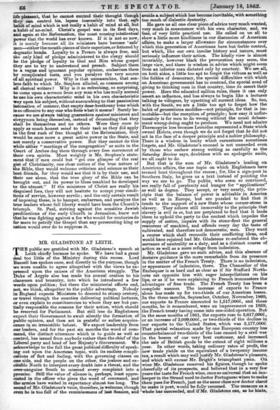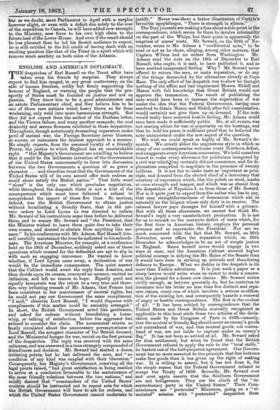MR. GLADSTONE AT TYITH.
T" public are gratified with Mr. Gladstone's speech at Leith chiefly because he spoke. We have had a great deal too little of the Ministry during this recess. Lord Russell has spoken once, and directly to the purpose, though we were unable to agree altogether with the views he ex- pressed upon the causes of the American struggle. The Duke of Argyle also has made his annual oration to his clansmen and tenantry, into which he introduced a few words upon politics; but there the ministerial efforts end, not, we think, altogether to the public advantage. Nobody in England expects Ministers to descend to stump oratory, or travel through the counties delivering political lectures, or even explain to constituencies to whom they are but par- tially responsible the reasons for their action, which should be reserved for Parliament. But still less do Englishmen expect their Government to await silently the formation of public opinion, and then act in grateful or sullen acquies- cence in an irresistible behest. We expect leadership from our leaders, and for the past six months the word of com- mand, the distinct utterance which is to guide as well as control, has issued from anybody rather than the chief of the Liberal party and head of her Majesty's Government. We acknowledge to the full the great political difficulty of speak- ing out upon the American topic, with its endless compli- cations of fact and feeling, with the governing classes on one side, and the people on the other, the jealous and ex- citable North to interpret every doubt into a threat, and the over-sanguine South to misread every. complaint into a promise. Still the value of silence is, perhaps, least appre- ciated in the officer who gives the word of command, and the armies have waited in expectancy almost too long. The sound of Mr. Gladstone's voice, therefore, is welcome, though even he is too full of the reminiscences of last Session, and whole has succeeded, and if Mr. Gladstone can, as he hints, avoids a subject which has become inevitable, with something too much of dialectic dexterity.
He gave us all one clear piece of advice very much wanted, very much in consonance with his own character, and, we fear, of very little practical use. He called on us all to show a little more kindliness in our discussion of American affairs, to make a larger allowance for circumstances over which this generation of Americans have but feeble control, but which, like our own insular history and nature, must seriously influence their action. The kindly view is almost invariably, however black the provocation may seem, the large view, and there is wisdom in advice which might seem from an inferior man dictated only by court*. We are all, on both sides, a little too apt to forget the virtues as well as the foibles of democracy, the special difficulties with which an American government has to contend, the special need of giving to thinking men in that country, time .to assert their power. Here the educated million rules, there it can only assert an influence, and has always to begin like a lecturer talking to villagers, by upsetting all current ideas. So, too, with the South, we are a little too apt to forget how the habit of generations modifies—not principle, for that is im- mutable—but the reception of principle ; how easy it unfor- tunately is for men to do wrong without the usual debase- ment wrong-doing ought to produce. We need not admire ThermopylEe less because Leonidas represented a State which owned Helots, even though we do not forget that he did not act in the face of a deeper principle and a nobler philosophy. There is a wisdom in lenity which earnestness sometimes forgets, and Mr. Gladstone's counsel is not unneeded even by those who eschew strong writing as carefully as the Saturday Review says, doubtless with an apologetic smile, we all ought to do. But that is the sum of Mr. Gladstone's leading. on. American affairs, the one topic on which Englishmen have seemed bent throughout the recess ; for, like a sign-post in Southern Italy, he gives us a text instead of pointing the way we are to go. The public, who seem so convinced, are really full of perplexity and hunger for "applications" as well as dogma. They accept, or very nearly, the prin- ciple that the balance of power is advisable in America as well as in Europe, but are puzzled to find that it tends to the support of a new State whose corner-stone is slavery. They adhere still immovably to the principle that slavery is evil in se, but are perplexed to find that it leads them to uphold the party to the contest which impedes the supply of cotton, impairs with its stone-fleet the general resources of mankind, and offends every day the taste of cultivated, and therefore not democratic, men. They want a course which shall reconcile their conflicting ideas, and would have rejoiced had Mr. Gladstone re-enforced the ob- servance of neutrality as a duty, and as a distinct course of action as well as a mere refuge from indecision. Mr. Gladstone gave no such advice, and this absence of decisive guidance is the more remarkable from its presence in the matter of the French Treaty. There is no indecision, or appearance of indecision, there. The Chancellor of the Exchequer is as hard and as clear as if Sir Stafford North- cote sat opposite him with eager interpellations on his lips, or as if he were explaining to French ironmasters the advantages of free trade. The French Treaty has been a complete success. The increase of exports to France alone has made up for two-thirds of our American losses. In the three months, September, October, November, 1860, our exports to France amounted to 1,517,0001., and these months, be it remembered, were an improvement on 1859, the French treaty having come into one-sided operation. But in the same months of 1861, the exports rose to 3,617,0001., or an increase of 2,099,0001., or two-thirds of the decline in our exports to the -United States, which was 3,177,0001. That partial relaxation made by one European country has counterbalanced two-thirds of the loss caused by a civil war in the bosom of our very best customer, and increased the sale of British goods to the extent of eight millions a year. In other words, taking ordinary rates of profit, the new trade yields us the equivalent of a twopenny income tar, a result which may well justify Mr. Gladstone's pleasure, and which will excuse Mr. Bright's triumphant pan. On wine Mr. Gladstone reserved his figures, though he spoke cheerfully of its prospects, and believed that in a very few years the taste for French wine, once so universal that an inn- keeper in the Strand used to doctor Portuguese wines to make them pass for French, just as the same class now doctor claret to make it port, would be fully reversed. The measure as a
but as we doubt, meet Parliament in April with a surplus however slight, or even with a deficit due solely to the cost of the expedition to Canada, he will have added new strength to the Ministry, new force to his own high claim to the future lead of the Lower House. And even if the result should be less pleasant than he led his Scotch audience to expect, he is still entitled to the full credit of having dealt with an exciting question like that of the Trent in a spirit which will remove much acerbity on both sides of the Atlantic.































 Previous page
Previous page